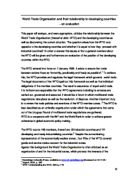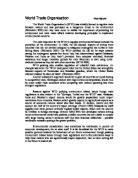WTO is to cooperate with the IMF and the World Bank in order to achieve greater coherence in global economic policy making.
The WTO counts 146 members, thereof are 35 industrial countries and 111 developing and newly industrialising countries. Despite the outnumbering representation of the economically weaker states, four fifths of the WTO covered goods and service trades account for the industrial states.
Against this background the World Trade Organization is often criticized as an organization of and for the industrial states, which protects the interests of the multinational companies and takes little consideration on the needs of the developing countries and rather weakens their foreign trade than strengthens it.
However the trade political situation of the developing countries is critical. On the 48 poorest countries of the WTO only scarcely half a per cent account for world trade. This is among other things because the agricultural commodity and textile market, which would be interesting for them, are protected by the industrial states. In fact in 2005 the world textile agreement expires, which hitherto should insulate the textile production of the industrialised countries from that in the developing countries. This will hopefully alter the trade relationships and include much further the developing countries. The multilateral liberalisation commitments, in particular the enclosure of the agricultural, textile, and clothing trade into the WTO agreement will strengthen the world trade position of the developing countries on a long-term basis and give them new chances to export driven growth.
At present the WTO tries to promote the economic development of the third world countries. Therefore it is permitted within the developing countries to take special measures for the improvement of their trade possibilities which deviate from the general clauses of the agreement. The aim is that by a more efficient execution of the development programs the economy will be strengthened and the general standard of living will be improved. Moreover these granted preferences are not subject of the most-favoured nation treatment principle, as the developing countries are not in the position, due to a low tariff standard, to submit their partners interesting counter offers. By this special treatment of the developing countries the WTO builds a system of different pace of liberalisation speeds and protectionist special zones.
The contracting parties also accredit, in the preamble of the WTO agreement, the necessity to assure the developing countries an appropriate proportion of world trade growth according their development status. The industrial countries are called upon to participate in the growth of the world trade of the developing countries and to diminish trade barriers to the greatest possible extent. That includes additionally that they work together within and beyond the GATT (General Agreement on Tariffs and Trade) in order to promote the aim of the GATT. However these goals do not present binding rules but only give the fundamental direction of the sequencing agreement.
Many of the exceptional provisions specified in the WTO agreement in favour of the economically weak states are nevertheless not made because of economical thinking but rather originated under political pressure. The industrialised countries have yield to the pressure partly because they claim similar exceptions or because the developing countries represent interesting sales markets themselves.
Within the WTO the developing countries are occasionally faced with discriminating behaviour of the industrial countries. The undemocratic dealing with the developing countries becomes obvious within the informal rounds of negotiations on the third Minister conference 1999 in Seattle. Judith Ann Maltz (Article from The Watertalk Forum) points out in her article that for example from the conference management, only selected partners participated in certain negotiations whereby the USA, Japan, Canada and the European Union always took part. Representatives from the developing countries “struggled to find meetings scheduled in unknown locations”. In these debates decisions were negotiated, which only had to accede later to the official committees. This was justified with the necessity for an efficient conduct of the negotiations.
Another further large problem results from the insufficient financial and personnel resources of the developing countries within the WTO. Many developing countries can only afford a small diplomatic representation in Geneva. This is in the light of the multiplicity of the residential international organisations not an adequate representation which ensures equitable cooperation in the WTO. Therefore it can be said, that attempts are made to encourage and involve the developing countries and the policies seem to be reasonable. But this should happen with a more human face. Nevertheless it is important to stay critical and there has to be consistently observation.
Word Count: 975
Word Count all parts: 4451
Cambridge University Press, available on [Accessed on 15.11.04 ]
WTO: Understanding the WTO, 2003, p.112
Yüksel, 2001, p.231 et seqq







